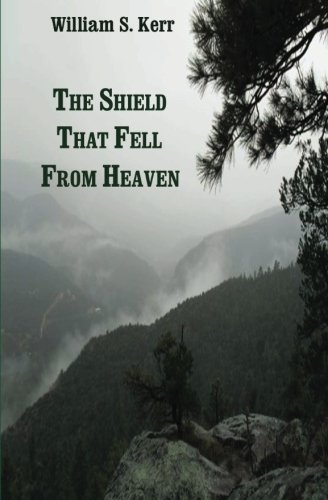
Ted Lacksonen

The Eagle Has Crashed is the provocative title of Ted Lacksonen’s first novel. Known as The Country Thinker on the Internet, Mr. Lacksonen has written a tale of what may be in store for this country if we don’t sober up and start walking the straight and narrow. His main concern is our mounting debt and how that could destroy our financial future and, through a chain reaction, tear our nation apart.
The near-future story follows the fortunes of many different people as a time of tribulations begins. Though a few high ranking officials do play a role, including the President of the United States, most of the characters are ordinary citizens in central Ohio, where Mr. Lacksonen lives. When the economy begins to crack, a series of mishaps, tragedies and catastrophes like a crescendo of disaster wracks the country. People become desperate and respond according to their nature, some digging in to take care of themselves, others making sacrifices for what they see as the good of the country.
Though I have some sympathy for it, I am not fully in agreement with the message of the book. I do not believe debt would be the prime driver of an economic collapse. Rather than close the deficit and pay down the debt, I would prefer to see government spending come down. I would even look favorably on, or at least view as an improvement, a budget deal that increased the deficit if it also cut revenues — that Washington euphemism for stolen money — and spending (a real cut, not the fake cuts we have been hearing about). Nevertheless, I do not argue that debt is trivial or innocuous, and it is nice to see an author use it as a backdrop for his tale.
[continue reading…]
Help Promote Prometheus Unbound by Sharing this Post

William S. Kerr
 William S. Kerr’s first novel, The Shield that Fell from Heaven, is a delightful surprise. It is not a book I would have expected to find from such a small publisher, Groton Jemez Publishing, and it is not a book I would have expected to find in this century. Indeed, had I been told it was written in the 19th, I would have believed it, at least until I came to a more modern science fiction element.
William S. Kerr’s first novel, The Shield that Fell from Heaven, is a delightful surprise. It is not a book I would have expected to find from such a small publisher, Groton Jemez Publishing, and it is not a book I would have expected to find in this century. Indeed, had I been told it was written in the 19th, I would have believed it, at least until I came to a more modern science fiction element.
It is written as the journal of a Frenchman who, in 1861, on the eve of our War for Southern Independence, comes to America as a war correspondent. Edouard de Grimouville is a minor noble whose House has lost most of its fortune. In the neutral state of Kentucky he finds political opinions of all stripes, a woman to fall in love with, and more adventure — and of an unforeseeable sort — than he was looking for.
Kerr writes with the prose of a bygone era, and does so convincingly, like a foreigner who has mastered a native accent. As a lover of that more sensuous, patient style, I was quite happy to immerse myself in it and would have gotten some enjoyment from the experience even if that had been the only appetizing aspect of the novel. There is, of course, much more to enjoy.
[continue reading…]
Help Promote Prometheus Unbound by Sharing this Post

Few philosophies have a greater mutual suspicion and natural antipathy to each other than libertarianism and ecology. This is not surprising, since the former takes the human individual and the latter the nonhuman environment, as its sovereign concern. But since our state-plagued era has seen the degradation of both individual liberties and the quality of the environment, we ought to question the degree to which these exist in an inverse relationship. Libertarians who wish to learn how to accommodate ecological ideas could do no better than to begin with a short 1975 novel by Ernest Callenbach, not because the novel has any libertarian intent (it clearly doesn’t), but because the principle of political decentralization, which Callenbach sees as an ecological necessity, leads him unconsciously, almost blindly, in a libertarian direction.
Ecotopia was clearly born out of the political and economic turmoil of the 1970s. As the book describes it, “The persistent inflation and recession of the seventies had caused widespread misery and undermined Americans’ confidence in economic progress.… And chronic Washington scandals had greatly reduced faith in central government.” Of course there was also a war that dragged on and on despite widespread opposition. In other words, it was a time much like our own, which may be why there has been a renewal of interest in the book in the last few years. A New York Times article from 2008 called it “The Novel that Predicted Portland” for its advocacy of green lifestyles. Well, not quite, as we shall see.
While contemporary greens tend to advocate greater power for national and international governmental agencies to regulate on behalf of the environment, Callenbach’s book was informed by decentralist and anti-authoritarian ideas of the New Left. These led him to a solution that had long since been thought impossible in American politics: secession. Ecotopia is also the name of a new nation in the novel, consisting of what used to be Oregon, Washington, and northern California, which seceded from the United States in 1980.1 In 1999, Will Weston, a journalist from what remains of the United States, sets out to write a series of articles about Ecotopian life. These, alternating with Weston’s private diary entries, comprise the novel.
[continue reading…]
Help Promote Prometheus Unbound by Sharing this Post













